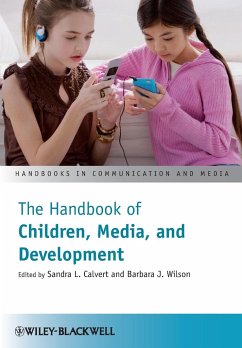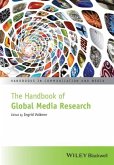Media use starts in the first year of life. Initial experiences arecontrolled by parents and caregivers, but increasingly give way tochildrenâ??s preferences. The degree to which theseexperiences are a positive or negative source of developmentalchange is an ongoing intellectual debate with significantimplications for todayâ??s society.
The Handbook of Children, Media and Development bringstogether an interdisciplinary group of experts in the fields ofdevelopmental psychology, developmental science, communication, andmedicine to provide an authoritative, comprehensive look at theempirical research on media and media policies within thefield.
25 newly-commissioned essays bring new research to theforefront, especially on digital media, developmental research, andpublic policy debates
Includes helpful introductions to each section, a theoreticaloverview of the field, and a final chapter that offers a vision offuture research
Contributors include key, international authorities in thefield
The Handbook of Children, Media and Development bringstogether an interdisciplinary group of experts in the fields ofdevelopmental psychology, developmental science, communication, andmedicine to provide an authoritative, comprehensive look at theempirical research on media and media policies within thefield.
25 newly-commissioned essays bring new research to theforefront, especially on digital media, developmental research, andpublic policy debates
Includes helpful introductions to each section, a theoreticaloverview of the field, and a final chapter that offers a vision offuture research
Contributors include key, international authorities in thefield
"This handbook is a meticulously researched 'tour-de-force' of the role media play in shaping child and family development. Through a multi-disciplinary analysis of the varied impacts the media are having on children's learning, social interactions, and healthy development, the handbook offers an authoritative, balanced perspective, while identifying pressing issues to be addressed by policymakers. It is a must-read for those who wish to understand the rich and subtle ways media influence children's lives every day."
--Michael Levine, PhD, Joan Ganz Cooney Center at Sesame Workshop
"The Handbook of Children, Media and Development assembles the most accomplished researchers in the field and presents in-depth and theoretically driven analyses of the most important research advances, including novel theorizing on recent technological innovations in the media. Essential as a text or reference for students, scholars, and policymakers. Understandable to undergraduates, but with depth and accuracy that scholars will appreciate."
--Joanne Cantor, Director, Center for Communication Research, University of Wisconsin-Madison
"Calvert and Wilson have gathered together a collection of up-to-the-moment research on how children use and are influenced by various mass media, but also on the business models underlying the industry and an array of possible policies and interventions designed to protect children. Students, scholars, policymakers, and parents will all find this book an invaluable resource."
--Donald F. Roberts, Thomas More Storke Professor Emeritus, Stanford University
--Michael Levine, PhD, Joan Ganz Cooney Center at Sesame Workshop
"The Handbook of Children, Media and Development assembles the most accomplished researchers in the field and presents in-depth and theoretically driven analyses of the most important research advances, including novel theorizing on recent technological innovations in the media. Essential as a text or reference for students, scholars, and policymakers. Understandable to undergraduates, but with depth and accuracy that scholars will appreciate."
--Joanne Cantor, Director, Center for Communication Research, University of Wisconsin-Madison
"Calvert and Wilson have gathered together a collection of up-to-the-moment research on how children use and are influenced by various mass media, but also on the business models underlying the industry and an array of possible policies and interventions designed to protect children. Students, scholars, policymakers, and parents will all find this book an invaluable resource."
--Donald F. Roberts, Thomas More Storke Professor Emeritus, Stanford University








